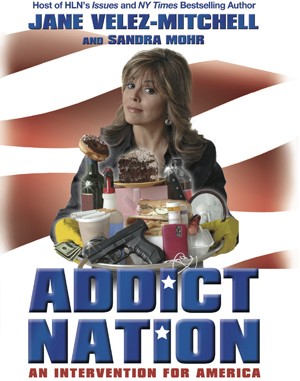Jane Velez-Mitchell Interview: HLN 'Issues' Host Seeks 'An Intervention for America'
Written by Melissa Parker, Posted in Interviews Authors
In her New York Times bestselling book, iWant, Jane Velez-Mitchell, host of HLN’s Issues, detailed how her addictive personality infiltrated her life and led her to over consume everything from alcohol to food to work to spending.
Mitchell, in her latest book, Addict Nation: An Intervention for America, targets our entire culture – arguing that Americans have collectively become dependent on and devoted to certain dysfunctions (including obsessive cleanliness, cruelty, sexual exploitation, food addiction, prescription drug dependency, overpopulation, overconsumption, war, incarceration, and crime).
"Addiction is progressive. The reason is that addicts build up a tolerance to their substance or behavior of choice so they need more of the same to get the equivalent hit each time. Invariably addiction will lead down to a terrible situation."
In addition to being one of the few openly gay journalists on television, the fifty-five year old New York native also has dedicated her time and resources to animal rights advocacy groups and various charitable causes.
Melissa Parker (Smashing Interviews Magazine): Jane, why was it the right time to write a book about America’s addictions?
Jane Velez-Mitchell: Well, because it’s completely out of control at this point. America is an addict nation. That’s why I wrote the book and that’s why I called it an intervention for America. Our addictions are not just individual addictions. They’re people in groups of millions with the same addictions that have become institutionalized in our culture so we fail to recognize them for the dysfunctional behaviors that they are and simply accept them as “normal.”
We’re basically cosigning each other’s bad behavior. If you’re doing it then it makes it okay for me to do it. This is what addicts do. Addicts get drunk in groups, they do drugs in groups, and they engage in all these other behaviors in groups. What addicts like to do is hang out with somebody whose just a little worse than they are so they can point to that person and say, “That person has a problem.” We’re doing this across the board with all of these addictions.

Jane Velez-Mitchell (HCI Books)
Melissa Parker (Smashing Interviews Magazine): How can we be strong and fight off these addictions when humans are basically creatures of habit?
Jane Velez-Mitchell: I think that’s an excellent question. The point is that we should not really want to engage in behavior that’s going to hurt us. That’s self destructive, so what we have to realize is what is in our true self interest as opposed to what is going to give us this little rush … this temporary passing rush.
Once we can have a moment of clarity and see that what we’re doing is really not going to make us happy but will make us miserable, that it’s really in our self-interest to change our ways, then we are motivated to take action. As long as we’re still buying the false notion that these things are making us happy, whether it’s over consumption or over eating or over purchase of cleaning products … as long as we’re still buying into that whole concept and that more is going to make us happy, then we’re not really going to dig ourselves out of that hole.
The first thing is to have a moment of clarity and hit bottom and see these behaviors for what they’re really doing to us. There are techniques to help us see these behaviors objectively. For example, I suggest to everyone to take an inventory of everything they consume, everything they eat, everything they buy, and everything they use for four or five days. At the end of those four or five days when you look at pages and pages and pages of stuff and plastics, decide if they were really necessary. You start to see it for what it is on the page. You can’t remain in denial. At that point you become sort of disgusted and that will help you also make the change.
I don’t say this like, “Oh, I’m the one who’s figured it all out.” I grapple with addictions. I’m very addictive. One of the reasons I wrote the book is that I’m in the throes of it all of the time. In the course of my journey to hopefully one day have ultimate emotional sobriety I’ve given up not just alcohol but drugs, smoking, meat, dairy, and sugar, and still grapple with a host of other substances.
I’ve slipped recently on diet soda, although I hope one day to get back on the bandwagon with that, not that I drink it constantly but I’ve had some slips with that and also white bread and salt. I grapple with these things because I’m a very addictive person. So I’m not coming at it like, “Oh, you guys have a real problem.” I’m talking about my problems just as much as I’m talking about everybody else’s problems.
Melissa Parker (Smashing Interviews Magazine): Sometimes we begin early in life when mom says, “clean your plate.”
Jane Velez-Mitchell: Yeah and you know what they say, “Don’t do what I do, do what I say.” Kids ultimately don’t listen to what parents say. They watch what they do and they mimic so there’s an obesity crisis among the adults and of course, there’s going to be an obesity crisis among the kids.
If you want your kids to be thin, you be thin, fit, and active. If we are exercising, if we’re eating right, it obviously encourages the kids to do the same thing. You can’t be sitting there being couch potatoes and eating a bunch of fast foods and telling the kids to eat vegetables.
Melissa Parker (Smashing Interviews Magazine): Is there such a thing as addictive personality disorder?
Jane Velez-Mitchell: Well, look; it’s a semantic question. Somebody can ask, “How would you differ bad habits from addictions?” You can call it whatever you want. In fact, we call it normal (laughs). It doesn’t mean it is normal. We could have a whole debate as whether there is such a thing as normal. But you can’t define addictive behavior. It is a craving that becomes overwhelming where you basically can’t intellectually stop yourself from doing that activity. You do it too much. After you do it you start feeling remorse and questioning why you did it and then you go into withdrawal and the craving comes back and you do it again.
Addiction is progressive. The reason is that addicts build up a tolerance to their substance or behavior of choice so they need more of the same to get the equivalent hit each time. Invariably addiction will lead down to a terrible situation. There are high bottoms and there are low bottoms. For example, alcoholics and drug addicts are people whom, after getting their first DUI they get it and go, “Oh, I’ve got a problem.” They get help through the 12 steps. There are people who can get 15 DUIs, lose their license, home, and job, and they still don’t get it. That’s a very low bottom. There are some people who are constitutionally incapable of getting the program. In 12 steps they say those people are constitutionally incapable of self-honesty because at the heart of it is self-honesty, to really acknowledge your activity for what it is.
What I do say in the book is that this is really a message to Americans to stop thinking of themselves as consumers. We are more than just consumers. We are citizens. We are individuals and America was founded by rugged individuals who have marched to their own drum and didn’t just march in locked steps in what they were told was the way they were supposed to behave. This is really the notion of being a consumer zombie. It’s not only self-destructive but it is destructive to our entire culture.
 We’re told that we need to keep spending so that our economy stays strong. That is also a lie that we bought into. Over the last three decades the average American salary has remained stagnant, but the wealthiest .01% of Americans have become even wealthier. Their incomes have shot up by 1,000%. Why is that? It’s because we’re all shopping at a relative handful of superstores and we’re visiting a relative handful of supersites.
We’re told that we need to keep spending so that our economy stays strong. That is also a lie that we bought into. Over the last three decades the average American salary has remained stagnant, but the wealthiest .01% of Americans have become even wealthier. Their incomes have shot up by 1,000%. Why is that? It’s because we’re all shopping at a relative handful of superstores and we’re visiting a relative handful of supersites.
What we’re doing as consumers is concentrating wealth in the hands of a few and we’re putting all the mom and pop businesses out of business. The government is a conspirator in this because they’re controlled by massive corporations and big industries. These big companies have their thumb on the scales. It’s not really capitalism anymore. It’s corporate socialism and the government is very much complicit in this.
Take a look at the obesity crisis. We wouldn’t have an obesity crisis were it not for the US government. The US government subsidizes agriculture business at billions and billions every year which creates the cheap corn and the cheap grain that gets fed to the cattle and hogs that allows them to produce the dollar hamburger as well as all of the other fast foods. If it weren’t for government subsidies there are estimates that the average hamburger would cost at least $12.
We pay very little as a percentage of our income for food in this country compared to other counties. It’s something like fewer than 10%, whereas in other countries it can be as high as 40% of the income that is spent on food. So, of course we’re eating too much. There’s the availability and the prices are kept artificially low by the US government.
Melissa Parker (Smashing Interviews Magazine): You talk in the book about celebrities being treated differently than “regular” people, especially in the justice system.
Jane Velez-Mitchell: Yes.
Melissa Parker (Smashing Interviews Magazine): I doubt the average Joe would be able to have home rehab. What do you think will happen to Charlie Sheen?
Jane Velez-Mitchell: Yeah, you know, all the messages that we’re sending him to be terminally unique and to believe that the rules don’t apply to him … that’s what is happening. I don’t know what’s going to happen to Charlie Sheen. One of the things about addiction is you really cannot force an addict to get sober if they don’t want to get sober. If they do not want to get sober there’s absolutely nothing you can do! Zero! You can hold an intervention, you can try to give them a moment of clarity, but ultimately it’s their decision. Only they can say when they’ve hit bottom so we’re powerless over what happens to Charlie Sheen.
Melissa Parker (Smashing Interviews Magazine): Charlie basically gets paid to act hungover. Talk about art imitating life. That can’t be good for his sobriety.
Jane Velez-Mitchell: No. I mean, if he loses his life in a car accident or some other terrible thing, which I hope he doesn’t, but it won’t matter then how many millions of dollars he has. He’ll be dead. So that’s why it’s more important at the end of the day to try to encourage him to be sober as opposed to rewarding him for his bad behavior.
Melissa Parker (Smashing Interviews Magazine): How can we turn this addiction epidemic around, whether it’s food, prescription drugs, or over consumption of material goods?
Jane Velez-Mitchell: Just a couple of weeks ago we had a big big snowstorm here in New York and the garbage piled up. They couldn’t collect it for days. So much of it was completely unnecessary with paper cups, plastic bags … plastic everything. There’s another way to do things but we as consumers have to turn it around and say we’re not going to do this anymore. We’re not going to participate.
One of the things that I like to say is that every single decision we make is not just a personal lifestyle decision. It’s a political decision, an environmental decision, and a moral decision. I ask people to start thinking about the wreckage they’re creating throughout the course of the day. The first step is to become a conscious hypocrite and then once you become a conscious hypocrite you can move toward dealing with some of the things you know are wrong. That’s the theme of the book.
Melissa Parker (Smashing Interviews Magazine): Scientists are saying that the planet may be unrecognizable by 2050 with a population of about 9 billion. Does that tie in with your theory of “gay is the new green?”
Jane Velez-Mitchell: Yes, I mean, it’s interesting. Nature does have a way to compensate when things go awry and that’s in the animal kingdom. We’re animals and so I do find it interesting that now we’re really seeing this global surge toward recognition of same sex partnerships. Obviously same sex couples cannot procreate in the traditional way that heterosexual couples can so isn’t it interesting that this is happening at a time when the survival of the species is dependent not so much on the ability to procreate but really on the ability to limit procreation because our planet cannot sustain the trajectory of population growth where it is currently headed. We just cannot sustain it.
After 2050 what’s going to happen? What’s going to happen 50 years after that if it keeps rising? We have to begin to curtail our population growth. This is essential. It doesn’t take … this is not political. I’m not political. I’m not left or right. I’m green. I would like the planet to survive and there’s actually a lot of commonality that we can find between left and right.
I think we all would like this planet to continue on but we have to make some changes. People have to start realizing that they can parent more than just their own biological children. They can parent all the orphans that need parenting, they can parent aspects of the world like nature. We have to just expand the notion of compassion beyond our immediate circle.
Melissa Parker (Smashing Interviews Magazine): Jane, what’s next for you?
Jane Velez-Mitchell: I’m trying to turn Addict Nation into a movement so I think the next thing that’s going to happen is to do a documentary, possibly on this book. We’re trying to turn this whole idea of less consumption into a movement that will help empower people to look at their consumption and make changes. They can save money, lose weight, be healthier and happier, and the planet can survive.
© 2011 Smashing Interviews Magazine. All rights reserved. This material may not be published, broadcast, rewritten or redistributed without the express written consent of the publisher.

